人教版初二英语下册语法
新人教版|八年级下册英语所有语法全汇总

新人教版|八年级下册所有语法全汇总一. 询问某人的健康问题及遭到麻烦的表达方法1. 询问某人患了何种疾病或遇到了何种麻烦时,常用以下几种结构来表达:What’s the matter (with sb.)?(某人)怎么了?What’s wrong (with sb.)?(某人)怎么了?What’s the trouble with sb? 某人出什么事了?What happened to sb? 某人发生了什么事?Are you OK? 你没事吧?Is there anything wrong with sb.?某人有不舒服/麻烦吗?2. 要表达身体疼痛或不舒服,可用以下结构:①某人+have/has+病症The twins have colds.双胞胎感冒了。
②某人+have/has+a+headache/toothache/stomachache/backache/earache.She had a stomachache last night. 她昨晚肚子痛。
③某人+have/has+a+sore+发病部位He has a sore throat. 他喉咙痛。
④某人+hurt(s)+身体部位或反身代词He hurt his leg. 他的腿受伤了。
⑤某部位+hurt(s).My head hurts badly. 我头痛得厉害。
⑥某人+have/has+a pain+in one’s+身体部位I have a pain in my chest. 我胸口痛。
⑦(There is) something wrong with one’s+身体部位There is something wrong with my right eye. 我的右眼有毛病。
⑧其他表达方式She has a heart trouble. 她有心脏病。
He got hit on the head. 他头部受到了撞击。
She cut her finger. 她割破手指了。
英语八下人教版重点语法

英语八下人教版重点语法
英语八下人教版的重点语法包括:
1.过去完成时(Past Perfect Tense):用来表示在过去某个时间或动作之前已经发生或完成的动作。
例如:I had already
finished my homework before my mom came back.
2.时间状语从句(Time clauses):用来表示时间关系的从句,一般以when,as soon as,until,before,after等引导。
例如:We will go to the park when it stops raining.
3.条件状语从句(Conditional clauses):用来表示假设条件的从句,一般以if引导。
例如:If it rains tomorrow, we will stay at home.
4.动词不定式(Infinitives):用来表示目的、原因、建议等。
例如:I went to the store to buy some groceries.
5.被动语态(Passive voice):用来强调动作的承受者而不是执行者。
例如:The cake was made by my mom.
6.定语从句(Relative clauses):用来修饰名词或代词的从句,一般由关系代词who,which,that引导。
例如:The boy who won
the competition is my neighbor.
这些语法结构在英语八下人教版教材中经常出现,需要学生掌握
和应用。
希望以上回答能对您有帮助。
新版人教版八年级下英语语法重点归纳(全)

新版人教版八年级下英语语法重点归纳(全)一、名词名词是指用来表示人、事物、地方、动物等的名称的词语。
名词分为可数名词和不可数名词。
可数名词有单数和复数两种形式,而不可数名词只有单数形式。
- 可数名词:表示单数时,名词前面通常有冠词a/an或者其它数量词进行修饰;表示复数时,名词通常要在词尾加“s”。
- 不可数名词:不可数名词表示的是无法分为个体的物体、概念、抽象事物等,通常不能用于复数形式。
二、动词动词表示人或物的动作、行为、状态或存在的词语。
动词分为及物动词和不及物动词。
- 及物动词:及物动词后面可以直接接宾语,表示动作的承受者或影响对象。
- 不及物动词:不及物动词不能直接接宾语,它可以后面接副词或介词短语,表示动作发生的方式、状态等。
三、形容词形容词是用来描述名词性词语的词语。
它可以表示人或物的性质、状态、特征、颜色等。
- 形容词可以修饰名词,放在名词的前面。
- 形容词还可以通过加后缀“-er”和“-est”来比较级和最高级。
四、副词副词是用来修饰动词、形容词和其他副词的词语。
副词可以表示时间、地点、方式、程度、频率等。
- 副词在句中通常位于动词、形容词或者其他副词的前面。
- 副词的比较级和最高级可以通过在前面加上more和most来表示。
五、代词代词是用来代替名词或名词性的词语的词语。
代词可以分为人称代词、指示代词、疑问代词、不定代词等。
- 人称代词表示人的身份或人称,包括主格和宾格两种形式。
- 指示代词用来指示特定的人或物,可以表示近处的、远处的或已提到的事物。
- 疑问代词用于提问,通常用来询问人或事物的身份、性质、数量等信息。
- 不定代词用来指代不特定或泛指的人或物,表示数量或程度。
六、冠词冠词是位于名词前面用来修饰名词的词语。
冠词分为定冠词和不定冠词。
- 定冠词指特指某一具体的人或事物,有两种形式:定冠词“The”用于表示特定的人或物,而不定冠词“A/An”用于泛指任意的人或物。
七、介词介词是用来表示人或物之间关系的词语。
新人教版八年级下册英语语法大全【强烈推荐】

所以 that 从句前有一个受 such 修饰的名词;而 so 是副词,用以修饰形容词或副词, 因此 that 从句前一般不出现名词。如 They are such kind-hearted teachers that people in the village all respect them. The exam was so difficult that many students failed to pass it. a) 如果名词是可数名词的单数形式,such 和 so 的位置不同:
她那样的嗓子。 � Such 常和表示结果的 that 从句搭配,表示“如此….以至于…”如 It was such a hot day that we all had to stay at home.
2
�
Such…that…和 so…that…都可用来引出一个结果状语从句。 由于 such 是形容词,
其它”结构。 h) 表示“越….越….”, 可使用“the+形容词或副词的比较级,the+形容词或副词
的比较级”结构。 2 .一般将来时
a)
一般将来时的构成: 由助动词 shall 或 will 加动词原形构成, shall 用于第一人称。
在口语中,will 在名词或代词后常简略为’ll, will not 常简略为 won’t。这个时态的 肯定,否定和疑问结构可表示如下:
的动作。这一特定的过去时间,除有上,下文暗示以外,一般用时间状语来表示 2. not …until 直到…才。表示动作在某时之前尚未开始,直到此时动作才开始。 not…until 可以用 after 或 when 来代替,但主句谓语动词要用肯定形式。Until 为连词 时后接时间状语从句,until 作介词时,后面接表示时间的名词。Until 用于肯定句多 表示动作或状态一直延续到 until 所表示的时间为止,意思为“直到…” from..till…中 till 往往表示不太具体的时间。From …to…或 from…until 常用来表示具体的时间。 3. find it…to do,it 在此句中为形式宾语代表动词不定式,动词不定式为真正的宾 语,常用于这种用法的动词有 find, feel, think, make 等。 4. “疑问词+不定式“结构相当于一个名词性从句,常常可用同等成分的从句代替。 改写时,只需在疑问词后面加一个适当的主语(这个主语一般与主句的主语一致) , 并将不定式改成适当形式的谓语即可。如,Where to go is still a question.= Where we should go is still a question. 5. when 与 while:when 连接的状语从句是个特殊句型,“前一个分句(谓语动词用 过去进行时)+when(作并列连词,意思为“这时,突然”)+后一个分句(谓语动词用一 般过去时)”表示在前一个动作正在进行的过程中突然发生了后一个动作, when 强
英语八下语法知识点人教版

以下是一些人教版八年级下册的英语语法知识点:
1. 情态动词的使用:如“will,can,should,may”等。
2. 现在完成时的理解与运用:表示过去发生的动作对现
在造成的结果。
3. 现在进行时的理解与运用:表示正在进行的动作或存
在的状态。
4. 动词不定式的理解与运用:表示未来的动作或存在的
状态。
5. 形容词和副词的比较级和最高级:如“more,less,least,most”等。
6. 被动语态的理解与运用:表示主语是动作的承受者。
7. 宾语从句的理解与运用:在句子中充当宾语的成分。
8. 状语从句的理解与运用:修饰动词、形容词、副词等。
9. 祈使句的理解与运用:表示请求、命令、建议等。
10. 反意疑问句的理解与运用:表示对陈述部分的肯定或
否定。
这些知识点都是学习英语语法的基础,需要同学们在学习
中不断练习和巩固。
如果有任何不理解的地方,可以向老师
或同学寻求帮助。
英语八下人教版重点语法

英语八下人教版重点语法英语学习中,语法是非常重要的一部分。
掌握好语法规则,不仅能够提高学生的语言表达能力,还能够帮助学生更好地理解和应用英语。
下面是英语八下人教版教材中的一些重点语法知识,希望对大家的学习有所帮助。
1. 一般现在时一般现在时是最基础的时态之一,表示经常性的、习惯性的或普遍性的动作或状态。
其构成形式是主语 + 动词原形(单三形式加-s或-es)。
例如:- We play football every Sunday.- He often brushes his teeth after meals.- The sun rises in the east.2. 一般过去时一般过去时用来表示在过去某个时间发生的或者惯常发生的动作或状态,其构成形式是主语 + 动词过去式。
例如:- I went to the park yesterday.- They studied English last night.- She visited her grandparents last summer.3. 一般将来时形式是主语 + will + 动词原形。
例如:- I will go to Beijing next month.- They will have a party on Saturday.- She will buy a new car in the future.4. 现在进行时现在进行时表示此时此刻正在进行的动作,其构成形式是主语 + am/is/are + 现在分词。
例如:- We are watching a movie now.- He is having lunch at the moment.- They are playing games in the park.5. 过去进行时过去进行时表示过去某个时间点正在进行的动作,其构成形式是主语 + was/were + 现在分词。
人教版英语八年级下册知识点总结

人教版英语八年级下册知识点总结一、语法知识点1. 时态:掌握一般现在时、一般过去时、一般将来时、现在进行时、过去进行时、过去将来时等时态的用法。
2. 过去进行时:用于表示过去某一时间正在进行的动作或状态。
3. 以下代词和副词的用法:- somebody, anybody, nobody, everybody 可用作主语或宾语。
- something, anything, nothing, everything 可用作主语或宾语。
- somewhere, anywhere, nowhere, everywhere 可用作地点副词。
4. 句型:掌握各种基本句型,如祈使句、选择疑问句、反义疑问句等。
5. 状语从句:掌握时间、原因、结果、条件等类型的状语从句的用法,并注意从句的引导词。
6. 定语从句:研究使用关系代词 who, whom, whose, which, that 引导定语从句,并了解先行词和关系词在从句中的作用关系。
二、词汇知识点1. 词汇拼写和用法:巩固和扩大基础词汇量,掌握词汇的正确拼写和用法。
2. 同义词和反义词:研究常用的同义词和反义词,提高词汇表达的能力。
3. 词组和固定搭配:掌握常用的词组和固定搭配,能够灵活运用。
三、阅读知识点1. 阅读理解:提高阅读理解能力,掌握快速获取信息的技巧。
2. 阅读策略:研究使用各种阅读策略,如扫读、略读、详读、推断等。
3. 阅读技巧:培养良好的阅读惯和技巧,如划重点、标记陌生单词等。
四、写作知识点1. 写作结构和组织:研究写作时合理安排文章结构和组织思路,使内容连贯。
2. 信息衔接和过渡:掌握信息衔接和过渡的方法,使文章各部分之间有逻辑性。
3. 词汇和句型运用:运用丰富的词汇和多样的句型,提高写作表达的准确性和流畅性。
以上为人教版英语八年级下册的主要知识点总结,希望能帮到你!。
人教版八年级下册英语——知识点语法归纳总结
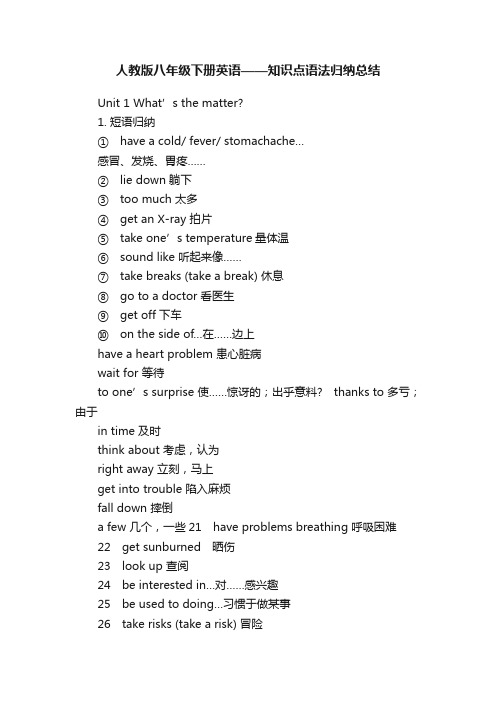
人教版八年级下册英语——知识点语法归纳总结Unit 1 What’s the matter?1. 短语归纳①have a cold/ fever/ stomachache…感冒、发烧、胃疼……②lie down 躺下③too much 太多④get an X-ray 拍片⑤take one’s temperature量体温⑥sound like 听起来像……⑦take breaks (take a break) 休息⑧go to a doctor 看医生⑨get off 下车⑩on the side of…在……边上have a heart problem 患心脏病wait for 等待to one’s surprise 使……惊讶的;出乎意料? thanks to 多亏;由于in time 及时think about 考虑,认为right away 立刻,马上get into trouble 陷入麻烦fall down 摔倒a few 几个,一些21 have problems breathing 呼吸困难22 get sunburned 晒伤23 look up 查阅24 be interested in…对……感兴趣25 be used to doing…习惯于做某事26 take risks (take a risk) 冒险27 lose one’s life 丧生28 became of 因为29 run out (of) 用尽,耗尽30 be ready to do sth. 准备做某事31 cut off 切除32 climb down 爬下33 get out of 离开;从……出来34 tell of 讲述35 the importance of (doing sth.) (做某事的)重要性36 be in control of 掌管,管理37 make a decision 做决定38 keep on doing sth. 坚持做某事39 give up 放弃40 cut/ hurt oneself 使自己受伤2. 典句必背①What’s the matter?②I have a stomachache.③What should I do?④Should I take my temperature?⑤I think you should lie down and rest.⑥If your head and neck still hurt tomorrow, then go to a doctor.⑦His love for mountain climbing is so great that he kept on climbing mountains even after this experience.3. 用法集萃(1) 当别人心情不好,身体不适或遇到麻烦时,我们可以用如下表达表示关心:What’s the matter?What’s the matter with you?What’s wrong with …?What’s the trouble\problem with …?(2) 英语中常用have描述身体的不适,此时have意为“患有”,常用结构:①have a + 疾病例:have a cold 感冒;have a fever 发烧;have a cough 咳嗽②have a + 身体部位-ache例:have a headache 头痛;have a toothache 牙痛③have a sore + 身体部位例:have a sore throat 咽喉痛;have a sore back 背痛(3) lie down躺下;tell lies/a lie 说谎含义过去式过去分词躺;平躺lay lain位于撒谎;说谎lied lied(4) maybe & may be①maybe,“或许”,常用于句首,表示可能性,后加句子。
人教版八年级下册英语重点词汇,短语,句型,语法总结

Unit 1 will people have robots?一、重点词汇:probably;able;interview;company;shape;impossible.二、重点短语:1. be scared of sb./sth. 恐惧某人/某物2. go up 上升,与rise 同义,与go down 或set 相反3. make a noise 发出声响,吵闹4. arrive in 到达,表示到达某一城市、国家等大地方时,用介词in;表示到达某一村庄、车站等小地方时,用介词at ;到达的地方用副词表示时,可不用介词。
5. not…until…直到……才……6. see…doing…停止做某事7. go cycling 相当于go to ride a bike ,意思是去骑车。
8. nit sb. on the head 表示“打某人的头”,表示的“打某人的脸”要用hit sb. in the face 。
9. turn around 转身10. fall off 摔下来11. give sb. a push 推某人一下12. help sb. do sth. = help sb. with sth. 帮助某人做某事13. get off 从……下来,通常指下火车、巴士、轮船、飞机等。
14. think about 思考、想起、想到(某人或某事)15. all day 一整天16. one by one 一个接一个地,类似有year by year 一年又一年;day by day 一天又一天。
17. hold on 有两个意思,一个是“(电话)不挂断”;一个是“抓紧”。
18. come down 下来三、重难点解析:1.比较级:less 最高级least2.agree:1) 表示“同意某人意见”时用agree with sb,该短语不能用于被动语态。
2) 表示“同意(某计划、办法、建议、条件)”时,用agree to(to在此用作介词,其后接名词、代词或者相当于名词的成分),该短语可以用于被动语态。
新人教版八年级下册英语语法知识点总结
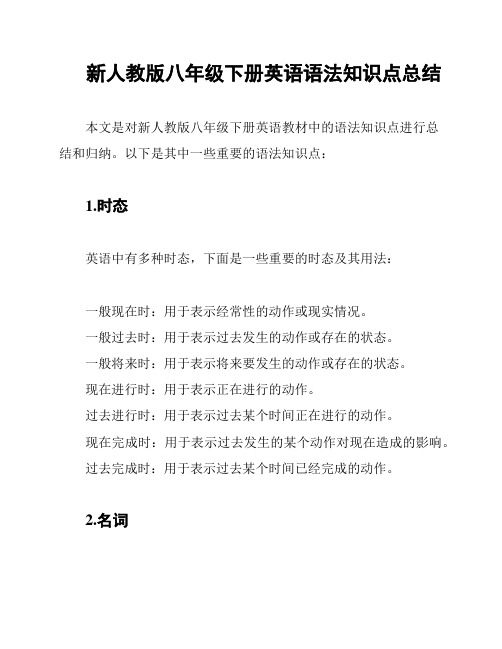
新人教版八年级下册英语语法知识点总结本文是对新人教版八年级下册英语教材中的语法知识点进行总结和归纳。
以下是其中一些重要的语法知识点:1.时态英语中有多种时态,下面是一些重要的时态及其用法:一般现在时:用于表示经常性的动作或现实情况。
一般过去时:用于表示过去发生的动作或存在的状态。
一般将来时:用于表示将来要发生的动作或存在的状态。
现在进行时:用于表示正在进行的动作。
过去进行时:用于表示过去某个时间正在进行的动作。
现在完成时:用于表示过去发生的某个动作对现在造成的影响。
过去完成时:用于表示过去某个时间已经完成的动作。
2.名词名词是指表示人、事物、地方、概念等具体或抽象事物的词语。
在句子中,名词可以作为主语、宾语、表语等。
一些常见的名词类型有:可数名词:表示可以用数目来计算的名词,可以有单数和复数形式。
不可数名词:表示无法以数目计算的名词,只有单数形式。
可数名词与不可数名词的区分。
3.代词代词是用来代替名词的词语。
根据指代的对象不同,代词可以分为人称代词、物主代词、指示代词、疑问代词等。
常见的代词有:人称代词:I。
you。
he。
she。
it。
we。
they。
物主代词:my。
your。
his。
her。
its。
our。
their。
指示代词:this。
that。
these。
those。
疑问代词:who。
whom。
whose。
what。
which。
4.形容词和副词形容词用来描述名词的性质或特征,副词用来修饰动词、形容词或其他副词。
常见的形容词和副词有:形容词:big。
small。
tall。
short。
happy。
sad等。
副词:slowly。
quickly。
carefully。
loudly。
well等。
5.介词介词用于表示名词、代词与其他词之间的关系,常常表示时间、地点、方向、原因等。
常见的介词有:in。
on。
at。
from。
to。
with。
without等。
以上是新人教版八年级下册英语语法知识的部分总结。
在学习英语的过程中,掌握这些语法知识可以帮助我们更好地理解和运用英语语言。
新人教版初二下学期英语语法总结及复习要点

新人教版初二下学期英语语法总结及复习要点一、被动语态被动语态用于描述主语所承受的动作或状态,其结构通常为“be动词+过去分词”。
初二下学期,学生将进一步学习被动语态的不同时态和用法。
1. 被动语态的构成被动语态的基本结构为“be动词(am/is/are/was/were)+过去分词”。
例:This book is written by a famous author.(这本书是一位著名作家写的。
)The window was broken by the strong wind.(窗户被强风吹破了。
)2. 被动语态的时态被动语态可以与各种时态结合使用,如一般现在时、一般过去时、现在完成时等。
例:This kind of car is sold very well.(这种车卖得很好。
)The project has been completed successfully.(这个项目已经成功完成。
)3. 被动语态的注意事项使用被动语态时,需要注意动词的及物性,只有及物动词才能用于被动语态。
同时,还要注意时态、语态和主谓一致的问题。
二、情态动词情态动词用于表达说话人的语气、情感或态度,常与其他动词原形连用。
初二下学期,学生将学习更多的情态动词及其用法。
1. 情态动词的种类常见的情态动词有can(could)、may(might)、must、shall、should、ought to、need等。
例:You can borrow this book from the library.(你可以从图书馆借这本书。
)They must finish their homework before going out.(他们必须在出去之前完成作业。
)2. 情态动词的用法情态动词可以表示能力、许可、义务、推测等意义。
学生需要掌握各种情态动词的具体用法和区别。
例:I could swim when I was five years old.(我五岁时就会游泳。
(完整版)Unit1人教版八年级英语下册语法与知识点,推荐文档

Unit 1第一部分:Grammar一、情态动词(Modal Verbs)情态动词should 意为“应该,应当”,必须和后面的动词原形一起构成谓语,没有人称和数的变化。
用以表达职责和义务、提出劝告,而且表述的是自己的主观看法。
注意:should 在以why,who,how 等疑问词开头的问句中,意为“竟然,居然,怎么会”,表示意外、惊喜或在说话人看来是不可思议的。
三、反身代词表示反射或强调的代词叫做反身代词。
反身代词是由第一人称、第二人称形容词性物主代词或第三人称代词的宾格形式,词尾加self 或selves 组成。
反身代词可译“本人”、“本身”,为加强语气,也常翻译为“亲自”、“自己”。
不定人称代词one ---- o neself.第二部分:单词用法Section A1.What’s the matter?怎么了?该句常用询问某人患了何种疾病或遇到了什么麻烦,其后用with 引出对象。
1). What’s the matter with sb.?=what’s wrong with sb.?=what’s the trouble/problem with sb.?=what’s one’s trouble/problem?e.g. What’s the matter w ith Tom?=what’s with Tom?=What’s the with Tom?=What’s Tom’s?2). matter, 名词,“问题,事情”e.g. We have important (matter) to discuss.我们有些重要的问题要讨论。
3). 动词,“要紧,关系重大”e.g. It dosen’t that you came late.2.I have a cold. 我感冒了。
1).have/get/catch a cold “感冒,着凉”The old man a cold yesterday.那位老人昨天感冒了。
八年级下册人教版英语语法知识点

八年级下册人教版英语语法知识点在学习英语的过程中,语法知识点是非常重要的一部分。
在八年级下册的人教版英语课程中,学生们需要掌握的语法知识点包括:一、时态英语时态有现在时、过去时和将来时,其中每种时态都有不同的用法和表示方式,学生需要掌握它们的用法以及相互转换的方法。
例如:1.现在时表示正在进行或经常发生的动作,如:I am studying English now.(我现在正在学习英语。
)2.过去时表示已经完成的动作,如:I watched a movie yesterday.(我昨天看了一场电影。
)3.将来时表示将要发生的动作或状态,如:I will go to Beijing next week.(我下周会去北京。
)二、被动语态被动语态是英语中非常常见的一种语态,它可以表示被动的动作或状态。
例如:1. The cake was made by Mary.(这个蛋糕是由玛丽做的。
)2. The book has been read by many people.(这本书已经被很多人读过了。
)学生需要掌握被动语态的结构和用法,特别是在口语和写作中的应用。
三、虚拟语气虚拟语气是英语中比较复杂的语法知识点之一。
它可以表示假设、愿望、建议等情况。
例如:1. If I were you, I would do it differently.(如果我是你,我会以不同的方式去做。
)2. I wish I could speak English fluently.(我希望我能流利地说英语。
)学生需要掌握虚拟语气的基本用法和结构。
四、情态动词情态动词是英语中的一类动词,它可以表示推测、建议、可能性等。
例如:1. You should stop smoking.(你应该戒烟。
)2. She might be late for the meeting.(她可能会迟到开会。
)学生需要认识到情态动词的语气和用法的变化。
人教版八年级英语下册重要语法知识点汇总

人教版八年级英语下册重要语法知识点汇总人教版八年级英语下册重要语法知识点汇总1. 否定句型1) 一般否定句I don't know this. No news is good news.There is no person (smoke)/not a person/not any person (smoke) in the house.2)特指否定He went to his office, not to see him.I am sorry for not coming on time.I don't think/believe/suppose/feel/imagine you are right.3)部分否定All the answers are not right//All is not gold that glittersI don't know all of them.//I can't see everybody/everything.Both of them are not right.4)全体否定None of my friends smoke.//I can see nothing/nobody.Neither of them is right.//Nothing can be so simple as this.5) 延续否定You didn't see him, neither/nor did I.You don't know, I don't know either.He doesn't know English, let alone/to say nothing of/not to speak of (更不用说) French.6) 半否定句We seldom/hardly/scarcely/barely hear such fine singing.I know little English. I saw few people.7) 双重否定You can't make something out of nothing.//What's done cannot be undone. There is no sweet without sweat.//No gain without pains.I can't help /keep/ laughing whenever I hear it.No man is so old but (that) he can learn.8)排除否定Everyone is ready except you.//He did nothing but play.But for your help, I couldn't do it.9)加强否定I won't do it at all.//I can't see it any more.//He is no longer a boy.2. 判断句型1) 一般判断句It is important for us to learn English.It is kind of you to help me sincere means honest.The boy is called/named Tom.We regarded/consider it as an honor.2)强调判断It is English that we should learn.//It is he who helped me a lot.3)弱式判断Your sentence doesn't sound/look/appear/feel right.You look/seem as if/as thought you had been there before.Maybe/Perhaps/ she is ill.He is probably ill.//He is likely ill. //It is possible that he is late 4) 注释判断He can remember so many English words, that is (to say) he is a living dictionary.(活字典)5) 正反判断That sounds all right, but in fact it is not.6) 比较判断It is more a picture than a poem.7) 互斥判断He or you are wrong. Either he is right or I am.3. 祝愿祁使句式1) 一般句式Study hard and keep fit. Be brave! Don't be shy! Get out of here.2)强语式Do tell me. Never tell a lie.3) 委婉祈使句Please tell me the true. Would/Will/Won't do me a favor?Would/Do you mind my smoking? What/How/ about going on foot?4)建议祈使句Let us go. Let us know the time. Don't let the fire out.Let's not waste the time. You'd better start early.Shall we listen to some music? Why don't you get something to drink? Suppose/supposing you pick me up at about six?I suggest we (should) take the train.5)祝愿句Success to you! //Wish you a good journey.May you have a happy marriage. //Here's to your success!Allow me to propose a toast to our friendship!4. 感叹句型How well he speaks! //How kind she is! //What a nice weather it is! Here he comes! //Such is life! //Wonderful! // Help!5. 疑问句型1) 一般疑问句Is he a doctor?//Do you the way to the station?2)反意疑问句He is a teacher, isn't he?//It is quite cheap, don't you think?3) 特殊疑问句What is the distance/width/size/population/temperature/fare?Who is he? What is he?(干什么的)//What is he like? // How is he? How do you like him? //What do you think of him?What ever do you mean by saying this?4)选择疑问句He is a doctor or a nurse?5)间接疑问句Do you know how old he is? //Tell me if (whether) you like it.What do you think/say/suppose I should do?6. 数词句型1) 表数目It is exactly ten o'clock.//It is five miles away from here.He is more than/over/ at least not less than 20.He is under/at most/no more than 20.2)表年月日He was born on April 22 1994/in 1994 on the morning of Oct.1.3)表年龄He is 20 years old/years of age.//He is at the age of 10.4)表倍数It is four times that of last years.This is four times as big (again) as that one.This is four times bigger than that one.The income is double what it was.The output of coal was 200% greater than in 1998.5)表计量It is 10 meters long/wide/high.//It costs me 100 yuan.I spent 10 hours to finish it.//It took me 10 days to finish it.It is worth 100 yuan.7. 关联指代句型1)两项关连I have two books, one is Chinese; the other English.I have five books, one is Chinese; the others English.To say is one thing, but/and/ to do is another.One the one hand, I am your teacher, and on the other hand, I am also you friend.Some like to play football, others are fond of basketball.2)先后顺序First/firstly, I wish good health, second/secondly success in your study, third/thirdly good luck in everything.First stop, then look, finally cross.At first/in the beginning/ he word hard. Later/Afterwards he is not so diligent.3)修饰限制This is the same book as I lost yesterday.This is the same book that I lost yesterday.(同一本书)Don't trust such a man as over praise you.He/One/Those/They who should come failed to appear.A man/A person/The one/Anyone/People who saw her liked her very much.The day/time/moment will come when China is strongest in the world.4) 两项连接He can speak not only English but also French.The book is both interesting and instructive.It is neither cold nor hot.Please either come in or go out.The old worker has experience and knowledge as well.5)加和关系Besides literature, we have grammar and writing.Apart from oxygen, there are some other gases in the air.In addition to "if", there is many other conjunctions that can introduce conditional clauses.I must go now, incidentally, if you want that book.You seem to like tea, so do I.8. 比较句型1)等比句He is as tall as I. // He is the same height as I.She is no less diligent than he. The lab is no better than a cottage.2) 差比句I speak English worse than he does.//He is not so/as tall as I am.Our knowledge is much inferior to their.3) 极比句He is the tallest of all in the class.None/No one/ is so blind as those that won't see.Nothing is so easy as this.4)比例句The more a man knows, the more he feels his ignorance(无知).5) 择比句He is taller than any other boy in the classIt is better late than never.//They would die than live as slavesHe prefers doing to talking//He prefers to do rather than to talk.He prefers mathematics to English.//I'd rather stay here.6)对比句You think me idle, but on the contrary, I am busy.They are working hard while you are wasting your time.9. 比喻句型We must work like him.//He behaves as his father does.He speaks English as if/though he was a foreigner.10. 条件假设句1) 一般事实If we succeed, what will the people say?Suppose it rains, what shall we do?Persevere(坚持) and you'll succeed.2)虚拟条件句If I were you, I would go.//If you had seen it, you would have been moved.3)反条件句Unless you try, you'll never succeed.//Don't move, or/else/otherwise I'll shot.4)唯一条件句If only I have another chance, I shall do better.Only in this way can we learn English well.So/As long as we don't lose heart, we'll succeed.5)推论条件句Since that is so, there is no more to say.Now that you are grown up, you must stop this behavior.11. 时间句型1)一般时When I see him, I'll tell him.2) 表同时You'll grow wiser as you grow older.Work while you work, play while you play.He worked, at the same/in the meantime he listened to the music.3)限制时Every/each time when I went to his house, he was out.By the time that we got there, he was out.4)交替时Sometimes he sings, sometimes he dances.At one time the baby cries, at another it talks.5)先时I stopped hem before he began to talk with me.6)后时I'll tell you after I finish it.7)紧接时As soon as I see him, I'll tell him.Once you begin, you must continue.The (very) moment/instant (that) I saw him, I recognized him. On hearing the news, she bust into tears.Hardly had I seen the light, when I heard a loud thundering.8)延续时I haven't seen him since I came here.A friend is never know till/until a man have need.12. 地点句型1) 一般地点Where have you been?Where there is a will, there is a way.2)方位Hebei lies in the east of China.Japan is lies to the east of China.The house faces (to) the south.He is sitting at the front of the classroomHe is standing in front of/before me.He is sitting at the back of/behind me.He is sitting in the back of/at the rear of the classroom. He is sitting next to/besides me.He is sitting close to/near me.At the top of/On top of the shelf, there are some books.He is sitting on the left/right.The mountain you see to the right is the Purple Mountain. 13. 原因句型He didn't go to school because he was ill.Since we are all here, let's begin our meeting.It might rain yesterday, for the ground was wet.Now (that) we have finished the work, we can go home.I am glad to meet you.I am sorry that I hear that.Thank you for your help.That is why he failed to come.He didn't come because of/on account of the weather.He went out of curiosity.I succeeded thanks to his help.This failure is due to the fact they lack experience.Owing to our joint efforts, the task was fulfilled.What are studying English for?For what reason did you choose this?What's the point of asking his to do that?How come you never told me about it?What with the wind and what with the rain, our walk was spoiled.14. 目的句型He stopped aside so that she could go in.He sits in the front in order that he can see words clearly.He gets up early so as to/in order to have time to do exercises. He repeated it for fear that there should be any mistake.15. 结果句型It was very cold, so that the river froze.They cost a lot of money, so/therefore we use them carefully. He is such a good man that every one likes him.He ran so fast that no one could catch him.He hurried to the house only to find that it was empty.I was caught in the rain. As a result, I had a bad cold.16. 程度句型How often do you write to your parents?How long do you stay at home?It is so beautiful that we all love it.It is too big for you.He is too excited to speak.He is not old enough to know this.The letter must be sent as soon as possibleYou must work as hard as you can.As far as I know, I can speak only English.17. 让步句型Though/Although he is rich, (yet/still) he doesn't show off.Yang as he is, he know a lot of things.Even if/though he succeeded, he was not proud.No matter what you say, I'll still try to do it.Keep calm, whatever happens.In spite of this, we must go ahead with our plans.Regardless of all the difficulties, we'll fight it out to the end.18. 转折句型I searched everywhere but could not find him.You may go, only return quickly.He is seriously ill, still there is hope of his recovery.It looked like rain, however it was clear in the afternoon.He is still young, yet he is high up in the position.He didn't tell me the truth, I know it, though.19. 省略句I think/say/suppose/expect/believe/hope so.Why not come earlier next time?。
人教版初中英语八年级下册全册各单元知识点、语法归纳整理
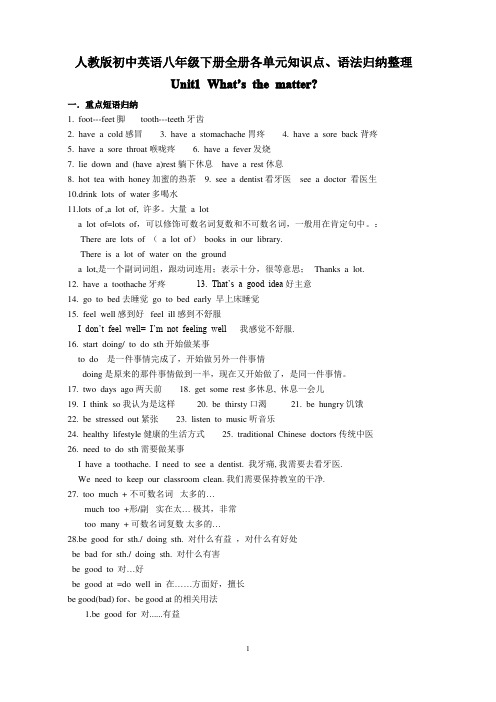
人教版初中英语八年级下册全册各单元知识点、语法归纳整理Unit1W hat’s the matter?一.重点短语归纳1.foot---feet脚tooth---teeth牙齿2.have a cold感冒3.have a stomachache胃疼4.have a sore back背疼5.have a sore throat喉咙疼6.have a fever发烧7.lie down and(have a)rest躺下休息have a rest休息8.hot tea with honey加蜜的热茶9.see a dentist看牙医see a doctor看医生10.drink lots of water多喝水11.lots of ,a lot of,许多。
大量a lota lot of=lots of,可以修饰可数名词复数和不可数名词,一般用在肯定句中。
:There are lots of(a lot of)books in our library.There is a lot of water on the grounda lot,是一个副词词组,跟动词连用;表示十分,很等意思;Thanks a lot.12.have a toothache牙疼13.That’s a good idea好主意14.go to bed去睡觉go to bed early早上床睡觉15.feel well感到好 feel ill感到不舒服I don’t feel well=I’m not feeling well我感觉不舒服.16.start doing/to do sth开始做某事to do是一件事情完成了,开始做另外一件事情doing是原来的那件事情做到一半,现在又开始做了,是同一件事情。
17.two days ago两天前18.get some rest多休息,休息一会儿19.I think so我认为是这样20.be thirsty口渴21.be hungry饥饿22.be stressed out紧张23.listen to music听音乐24.healthy lifestyle健康的生活方式25.traditional Chinese doctors传统中医26.need to do sth需要做某事I have a toothache.I need to see a dentist.我牙痛,我需要去看牙医.We need to keep our classroom clean.我们需要保持教室的干净.27.too much+不可数名词太多的…much too+形/副实在太…极其,非常too many+可数名词复数太多的…28.be good for sth./doing sth.对什么有益,对什么有好处be bad for sth./doing sth.对什么有害be good to对…好be good at=do well in在……方面好,擅长be good(bad) for、be good at的相关用法1.be good for对......有益Doing morning exercises is good for your health.做早操对你们的建康有益。
人教版八年级英语下册语法归纳

八年级下册重点语法和短语Unit 1 Will people have robots?重点语法:一般将来时态的应用do/does 的一般将来时态形式:(shall/will) dodo/does 的一般将来时态的被动语态:(shall/will) be done一般将来时态的肯定句、否定句、疑问句形式:肯定句例句:People will have robots in a few years.否定句例句:People (will not/won't) have robots in a few years.一般疑问句例句:Will people have robots in a few years?特殊疑问句例句:What will people have in a few years?重点短语:won't = will notthey'll = they willshe'll = she willhe'll = he willI'll = I willfall in love with(sb./sth.) 爱上(某人/某物)be able to do sth. 能够做某事come true 实现in the future 未来hundreds of 数以百计的thousands of 数以千计的look for(sb./sth.) 寻找(某人/某物)will → would 情态动词will 的原形和过去式may → might 情态动词may 的原形和过去式Reading Strategy(阅读方法)Look at the title and picture, and predict what you will read about. (看着标题和图片,预知你要阅读那些方面的内容。
)This helps you get ready to acquire new information. (这样可以帮助你获得一些新的信息。
人教版英语八年级下册 单词 短语 语法
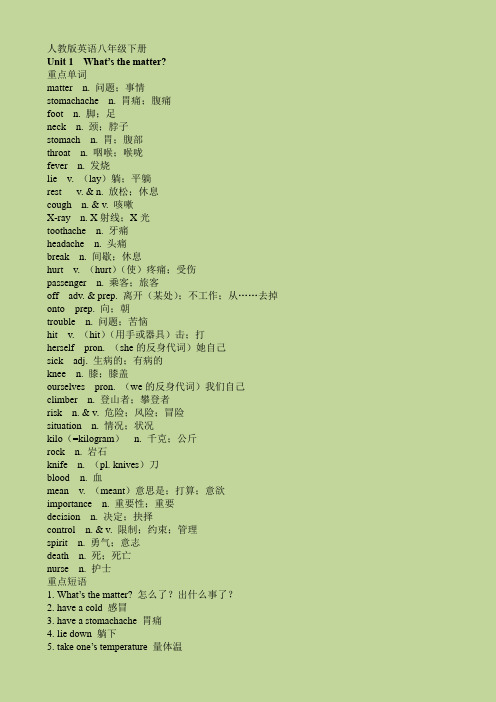
人教版英语八年级下册Unit 1What’s the matter?重点单词matter n. 问题;事情stomachache n. 胃痛;腹痛foot n. 脚;足neck n. 颈;脖子stomach n. 胃;腹部throat n. 咽喉;喉咙fever n. 发烧lie v. (lay)躺;平躺rest v. & n. 放松;休息cough n. & v. 咳嗽X-ray n. X射线;X光toothache n. 牙痛headache n. 头痛break n. 间歇;休息hurt v. (hurt)(使)疼痛;受伤passenger n. 乘客;旅客off adv. & prep. 离开(某处);不工作;从……去掉onto prep. 向;朝trouble n. 问题;苦恼hit v. (hit)(用手或器具)击;打herself pron. (she的反身代词)她自己sick adj. 生病的;有病的knee n. 膝;膝盖ourselves pron. (we的反身代词)我们自己climber n. 登山者;攀登者risk n. & v. 危险;风险;冒险situation n. 情况;状况kilo(=kilogram)n. 千克;公斤rock n. 岩石knife n. (pl. knives)刀blood n. 血mean v. (meant)意思是;打算;意欲importance n. 重要性;重要decision n. 决定;抉择control n. & v. 限制;约束;管理spirit n. 勇气;意志death n. 死;死亡nurse n. 护士重点短语1. What’s the matt er? 怎么了?出什么事了?2. have a cold 感冒3. have a stomachache 胃痛4. lie down 躺下5. take one’s temperature 量体温6. have a fever 发烧7. take breaks(take a break)休息8. get off 下车9. to one’s surprise 使……惊讶的;出乎……意料10. right away 立即;马上11. get into 陷入;参与12. be used to 习惯于……;适应于……13. take risks(take a risk) 冒险14. run out (of) 用尽;耗尽15. cut off 切除16. get out of 离开;从……出来17. be in control of 掌管;管理18. give up 放弃重点句型1. —What’s the matter?—I have a stomachache.2. —W hat’s the matter with Ben?—He hurt himself. He has a sore back.3. —Do you have a fever?—Yes, I do. / No, I don’t./I don’t know.4. —Does he have a toothache?—Yes, he does.5. —What should she do?—She should take her temperature.6. —Should I put some medicine on it?—Yes, you should. / No, you shouldn’t.7. You shouldn’t eat so much next time.He should lie down and rest.He should see a dentist and get X-ray.重点语法1. have在涉及健康问题的句子中的应用。
人教版初中英语八年级下册语法知识点
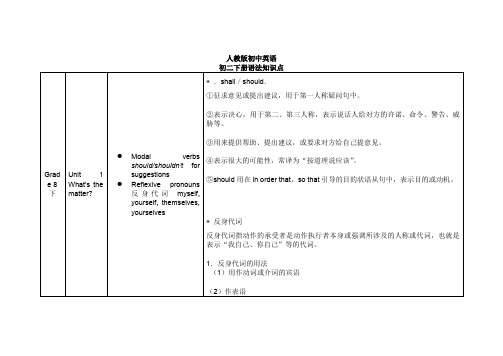
4.动词+副词+介词(其后需加宾语)
5.动词+名词(其后不加宾语)
make a bed整理床铺take place发生make faces做鬼脸
6.动词+名词+介词(其后需加宾语)
It is very kind of you to help me.=You are very kind to help me.你帮我的忙,太谢谢你了。
5.疑问词和不定式连用和疑问词连用的不定式在句中相当于名词,常作主语、宾语、表语、同位语等。
6.省略to的不定式
(1)当两个(或两个以上的)不定式由and,or,than等连接时,通常只需在第一个不定式前用to,其余不定式前的to可省略。
4)当某些结构后的不定式动作与句中某一动作重复时,不定式符号to之后的其他成分可以省略,只保留不定式符号to。常见结构有:be able to,be going to,have to,ought to,used to等。
8.不定式的主动表示被动
①在“be+性质形容词+不定式”结构中。
此类形容词有easy,hard,difficult,interesting,heavy,pleasant,comfortable,safe,dangerous,impossible等。
4.不定式的复合结构不定式用for和of引出逻辑主语,带有逻辑主语的不定式称为不定式的复合结构。不定式的复合结构在句中可作主语、宾语、定语等。
当作表语的形容词表示人的性格、品质时,常用of引出不定式的逻辑主语,否则用for引出。常见的表示性格、品质的形容词有:
good好的kind和蔼的brave勇敢的honest诚实的lazy懒惰的nice好的wise明智的clever聪明的silly傻的stupid笨的foolish愚蠢的right正确的wrong错的rude粗鲁的polite礼貌的fair公正的unfair不公正的careless粗心的careful细心的patient耐心的
- 1、下载文档前请自行甄别文档内容的完整性,平台不提供额外的编辑、内容补充、找答案等附加服务。
- 2、"仅部分预览"的文档,不可在线预览部分如存在完整性等问题,可反馈申请退款(可完整预览的文档不适用该条件!)。
- 3、如文档侵犯您的权益,请联系客服反馈,我们会尽快为您处理(人工客服工作时间:9:00-18:30)。
人教版初二英语下册语法现在进行时现在进行时的基本用法1.表示说话时正在进行的动作常和now 连用,有时用一个look、listen ,来表now 这一时间概念。
*Look! A train is coming .看,火车来了。
*Listen! He is playing the piano.听,他在弹琴。
2.表示现阶段正在进行的动作但不一定是说话时正在进行。
常和at present ,this week ,these days…等时间状语连用。
*What lesson are you studying this week你们本周学哪一课了(说话时并不在学)3.现在进行时有时可用来表示一个在最近按计划或安排要进行的动作即是说可以用来代替将来时,但此时,一般要与表示将来时的时间状语连用,而且仅限于少量动词。
如:go, come, leave, start, arrive, return . sleep*Are you going to Tianjin tomorrow 你明天去天津吗?*How many of you are coming to the party next week 你们有多少人下周要来参加晚会?三、一般将来时█一般将来时going to+ 动词原形~对于将要发生的事,或打算、计划、决定要做的事情时,皆以be going to + 动词原形的句型来表示。
因此此句型有be动词,所以是否用am, is, are ,决定于主语。
1.肯定句:主语+be (is, am, are) going to +动词原形I am going to play football next Sunday.下周日我打算踢足球。
◇He is going to travel around the world. 他计划周游世界。
◇They are going to meet outside the school gate. 他们打算在校门口见面。
◇It is going to rain. 要下雨了。
2.否定句:主语+be (am, are, is) not going to +动词原形We are not going to have any classes next week. 下周我们不上课。
◇I’m not going to be a teacher. 我不打算当老师。
◇He isn’t going to see his brother tomorrow. 他明天不准备去看他哥哥。
3.疑问句:Be (Am, Is, Are) +主语+ going to + 动词原形◇Are you going to be a doctor when you grow up 你长大了,打算当一名医生吗Yes, I am. 是的,我打算当。
No, I’m not. 不,我不打算当。
will 同be going to 的用法相同以今天为起点的所有将来时间,如:this afternoon / this evening = tonight / tomorrow/tomorrow morning / afternoon / evening ,the day after tomorrow / next week ,next Wednesday / next month,next September / next year.★“be going to + 动词原形” 表示计划、打算、将来发生的动作,常和this afternoon (今天下午),this evening = tonight (今晚),tomorrow (明天),tomorrow morning (afternoon ,evening ) (明早,午,晚),the day after tomorrow(后天),next Sunday (下个星期天),next week (下周),next month (下个月),next year (明年)等的时间状语连用,前不加任何介词。
另外,动作性动词go ,come 和leave 等的现在进行时表示一般将来时动作。
四、形容词和副词的比较级和最高级1.比较级:句子表示两者之间的比较时用比较级,其标志词是than, much, a little , even和still等。
. ①Her hair is much longer than mine. 她的头发比我的长多了。
②I’m a little older than you. 我比你大一点儿。
2.最高级:句子表示三者或多者的比较时用最高级,其标志词是表示范围的in…或of …介词短语。
在句子中,形容词最高级前必须加the。
. ①The boy is the tallest in our class. 这个男孩是我们班最高的。
②Which is the biggest, the sun, the moon or the earth?★形容词的比较级和最高级:形容词有三种等级:原级、比较级、最高级。
3.原级:句中只有一者时用原级,其标志词是very, so, too, quite等。
. His handwriting is very good.他的书法很好。
(一个人不作比较。
)★形容词比较级和最高级的构成:1.一般在原级后加er 构成比较级,加est构成最高级。
. small smaller smallestyoung younger youngest2.以不发音的字母e 结尾的形容词,直接加r 或st 构成比较级和最高级。
. nice nicer nicestlate later latest3.以辅音字母+y 结尾的形容词,变y为i ,再加er 或est, 构成比较级和最高级。
. busy busier busiestheavy heavier heaviest4.在重读闭音节中,末尾只有一个辅音字母的形容词,要先双写这个辅音字母,再加er或est,构成比较级和最高级。
. hot hotter hottestbig bigger biggest5.个别形容词的比较级和最高级是不规则变化,需个别记忆。
. good (well) better bestbad (badly, ill) worse worstmany (much) more mostlittle less leastfar farther farthest或further furthest★副词的比较级和最高级:1.以ly 结尾的副词,除early 变为earlier 和earliest 外,其余一律在其前加more 和most。
如:carefully – more carefully – most carefully2.规则变化直接加er 和est 。
如:fast – faster—fastest3.个别词是不规则变化,需要特别记忆。
4.句子中,副词最高级前的the 可省略也可以不省略,但形容词最高级前面的the 绝对不能去掉。
. Who runs (the) fastest, Tom, Jim or Mike?五、提建议的表达方法、表示需要、询问方向、指点方向★表示建议的基本句型1. Shall I / we + 动词原形?2. Why don’t you + 动词原形= Why not + 动词原形3. Let’s + 动词原形4. What/ How about + doing sth.★表示需要的基本句型1.表示需要用need。
它可当情态动词和行为动词用。
. ①We need your help.(行为动词)我们需要你的帮助。
②They need finish reading the book today. (情态动词)他们需要今天看完这本书。
2.询问方向,主要有以下几种表达方式:⑴Is there a bus station near here 附近有汽车站吗?⑵Where is the nearest bus stop / station 最近的汽车站在哪里?⑶Which is the way to the bus station 去汽车站的路是那一条?⑷How can I go to the bus station 如何去公共汽车站?3.指点方向,主要有以下几种表达方式:⑴Go / walk along the road / street. 沿着这条路/街走。
⑵Take the first (second…) turning on the right / left. 在第一(二……)个路口向右/左转。
⑶It’s next to (in front of , behind…) 它在……旁边(前面,后面……)⑷It’s about a hundre d metres along on the left. 它在左前方大约一百米处。
⑸Turn right / left. = turn to the right / left. 向右/左拐。
六、一般过去时◆一般过去时主要表示过去的动作或状态。
在句子中由主语+动词的过去式来表达。
walks to school. (一般现在时)walked to school. (一般过去时)例如:例1.中的动词walks时现在式, 由于主语是第三人称单数he,因此原因的walk必须加上“s”,表示目前习惯性、经常性动作。
可译为“他现在经常步行上学”。
例2.中的动词walked是过去式,过去式是叙述过去事情的动词形式,所以这句话时表示的是过去的某时,例如昨天、上周或学生时代等过去的某一时间,这句可译为“他曾经步行上学”。
◆be 动词的过去式be 动词的过去时的句型如下:肯定句:主语+be动词的过去式(was, were)~否定句:主语+ be动词的过去式(was, were)+ not ~疑问句:be动词的过去式(was, were)+ 主语~○He was busy yesterday. (肯定句) 他昨天很忙。
○He was not busy yesterday. (否定句) 他昨天不忙。
○Was he busy yesterday (疑问句) 他昨天忙吗动词过去时的肯定句Mike was in the United States last year. 麦克去年在美国。
比较be 动词的现在式和过去式:There is (are ) 的句型用于一般过去时需把is ,are 变为它们的过去式:There was (were) …?动词过去式的否定句He was not in Canada last year.他去年不在加拿大。
be动词过去时的否定句的结构和现在时一样,只要在be动词过去式(was, were)后面加上not就可以了。
